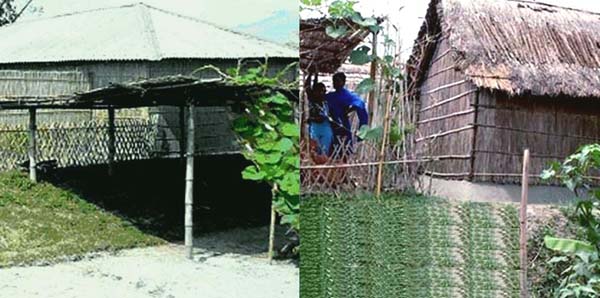RANGPUR, Nov 23, 2018 (BSS) -Thousands of people living in riverine char
areas have successfully adapted them to climate change, natural disasters and
adverse situations like floods, river erosion and abject poverty.
Experts said some six lakh people of over 1.33 lakh distressed families
living in the areas have achieved the success on the Brahmaputra basin after
a long struggle with natural disasters for survival.
The Chars Livelihoods Programme (CLP), a joint initiative of the government
and non-government organisations, brought the significant changes to the
livelihood and living standard of the char people during the 2004-2016
period.
Earlier, these have-nots group char people, who became homeless and
landless due to river erosion and floods, had to struggle every day only to
get some food for survival of their family members.
Side by side with helping the char people to adapt to the adverse situation
under changing climate, the comprehensive CLP programme helped them to
generate income along with successfully managing the natural risks and
challenges.
Rashid, Senior Coordinator (Agriculture and Environment) of RDRS
Bangladesh, one of the CLP programme implementation partners, said the
programme effectively assisted the char people to manage natural risks and
disasters for survival.
“Successful implementation of the CLP programme helped six lakh char people
in achieving self-reliance through income generation activities to improve
livelihoods under the adverse situation after successfully adapting to
changing climate,” Rashid said.
The interventions for adapting to adverse impacts of climate change began
with building houses on raised plinths during flooding periods in the rainy
season.
“The CLP programme was implemented in the riverine island chars of
Kurigram, Bogura, Gaibandha, Sirajganj, Jamalpur, Lalmonirhat, Nilphamari,
Rangpur, Pabna and Tangail districts on the Brahmaputra basin in 2016,”
Rashid added.
Talking to BSS recently, CLP beneficiaries Mahmuda, Rahela and Kulsum Begum
narrated as how they successfully adapted to climate change in Purbo Char
Gunai village on the Teesta riverbed in Kawnia upazila of Rangpur.
“Our families used to take shelters during floods in neighboring areas,
flood control embankments, highlands or other facilities every year in the
past,” said Rahela adding that the displacements caused huge losses to their
assets essential for survival.
With CLP assistance, they first raised plinths to build new houses, then
got training on various awareness building issues, health, hygiene,
sanitation, assistance and inputs to begin various income generation
activities for earning to live better.
Later, they started cultivating vegetables, animal husbandry, poultry, tree
plantation, setting up of compost heaps on raised homesteads and small
businesses and establishing tube wells and sanitary latrines to get rid of
water borne diseases.
“Now, we can stay at homes safely with our assets and cattle heads during
floods on raised plinths and provide shelters to other flood-hit char people
of neighbouring areas,” said Kulsum.
Chairman of Rangpur-based research organisation ‘Northbengal Institute of
Development Studies’ Dr Syed Samsuzzaman said floods and river erosion
affected life and livelihoods of char people, their agriculture, environment
and even existence on char areas in the past.
“Successful implementation of the comprehensive CLP programme assisted char
people in coping with changing climate along with achieving self- reliance
through income generation activities to lead better life now,” Samsuzzaman
added.



